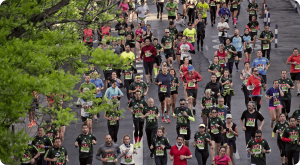Proper post-marathon recovery is important because it helps your body and mind bounce back after the big race. It’s like giving yourself a well-deserved break after running a marathon.
In short, proper post-marathon recovery is all about giving your body and mind the care they need so you can keep running strong in the future!
Let’s unwrap what are the crucial components of post-marathon recovery.
If you are just starting your training, check out this marathon training plan for novice athletes to learn more about the right training strategy and workout schedule examples.
Immediate Recovery
Immediate recovery is all about taking care of your body right after you finish running a marathon.
First, you need to drink water or sports drinks to replace all the fluids you lost from sweating during the race. This helps you rehydrate and feel better faster.
Within an hour after the race, eat a meal or snack that has carbs and protein. A sandwich or a smoothie will be great options. This gives your muscles the fuel they need to start repairing.
Take a rest. Your body needs a break after running 42.2 kilometers!
Resting helps your muscles recover and lets you recharge both physically and mentally.

Active Recovery
Once you feel good and energized, you can start doing light activities in the days after the marathon. This will help your body bounce back.
Go for a gentle walk, swim, or bike ride. It helps your blood flow to your muscles, which allows them to heal faster.
As a part of your post-marathon training, incorporate light stretching exercises. Stretching helps loosen tight muscles, keep joints flexible, and prevent injuries.
Additionally, using a foam roller or getting a massage can soothe sore muscles and speed up recovery.
Nutrition and Hydration
Keep on drinking water throughout the day to maintain hydration levels. Monitor urine color; pale yellow indicates adequate hydration.
Consume a well-balanced diet with carbohydrates, proteins, healthy fats, and plenty of fruits and vegetables. Foods rich in antioxidants, such as berries, leafy greens, and nuts, help reduce inflammation and support recovery.
Replace lost electrolytes through foods like bananas, oranges, nuts, seeds, and electrolyte drinks.
Adequate sodium, potassium, and magnesium intake is essential for muscle function and hydration.
Read our expert breakdown of magnesium’s role in muscle recovery and performance in our article on magnesium for athletes.
Your pre-race breakfast can determine your success. Learn what to eat before a marathon to fuel your journey to the finish line.

Rest and Sleep
Try to have a good night’s rest for 7-9 hours to support physical and mental post-race recovery.
This is important for your muscle healing, hormone regulation, and immune function. Avoid strenuous activities and high-impact exercises to give your body time to heal.
For more rest strategies, check out our triathlon recovery guide.
Self-Care
Consider taking an ice bath or cold-water immersion to reduce inflammation and muscle soreness. Aim for 10-15 minutes in water between 50-59°F (10-15°C).
Wear compression garments, such as socks or sleeves, to improve circulation and reduce swelling. Compression may help alleviate muscle soreness and fatigue.
Schedule a gentle massage to relieve muscle tension, promote circulation, and enhance relaxation. A sports massage can target specific areas of tightness and aid in recovery.
Listen to Your Body
Monitor for any signs of injury, such as sharp or persistent pain, muscle damage, swelling, or limited range of motion.
Listen to your body and seek physical medicine if you experience any concerning symptoms.
Ease back into training gradually, starting with light activities like walking or easy jogging.
Avoid intense training or long runs for the first-week post-marathon to prevent overtraining and injury.
We know you want to sign up for the next race, but try to slow your training efforts.
Mental Recovery
Take time to reflect on your running performance, celebrate how far you’ve come and see if there are anything you would like to do better next time.
It is important to champion your efforts as well as learn lessons from the challenges you encountered during the race, especially if it was your first marathon.
If you feel like there are too many things to improve, consider working with a certified running coach. Join TriWorldHub to find your coach.
Set new goals for future races or training cycles to maintain motivation and focus.
Whether it’s crossing that finish line faster, tackling a new distance, or mastering a specific aspect of your training, having goals helps keep you motivated and committed to your running journey.
Long-Term Recovery
Long-term recovery is about giving your body the time and support it needs to rebuild, repair, and rejuvenate over the weeks and months following the race.
During this time, you want to incorporate periods of active recovery and lower-intensity training into your long-term training plan.
Periodization helps prevent burnout, overtraining, and injury by balancing high-intensity workouts with periods of rest and recovery.
Include cross-training activities like swimming, cycling, or yoga in your training routine to maintain cardiovascular fitness, improve flexibility, and minimize the injuries chances.
Cross-training also provides mental stimulation and variety in your workouts.
If you are incorporating elements of the Norwegian method into your training plan, check out how the Norwegian periodization works.

Future Planning
Continue to prioritize proper nutrition and hydration in your day-to-day life, not just during training cycles or race events.
Implement strategies to prevent injuries in future training cycles, including strength training, flexibility exercises, and proper rest and recovery.
Address any muscle imbalances, weaknesses, or movement dysfunctions to decrease overuse injury risks and improve running efficiency.
The recovery process is an important part of the training routine, so be patient with yourself and give your body the time and care it needs to bounce back stronger than ever!
If you are wondering how to face all the challenges during race preparation and the run itself, check out my marathon story.
Frequently Asked Questions
Why is post-marathon recovery important?
Post-marathon recovery is important because it gives your body time to rest and heal after its peak fitness performance.
It helps prevent injuries, gives your muscles a chance to recover, and boosts your energy levels so you can get back to training feeling strong and ready.
How long should I take to recover after running a marathon?
Recovery time varies, but generally, plan for about one to two weeks of easy activities like walking or swimming after a marathon.
Listen to your body and gradually return to your normal training routine once you feel fully recovered.
What should I eat or drink during post-marathon recovery?
After finishing a marathon, eat meals that have a mix of carbs and protein to help your muscles recover.
Good choices include turkey sandwiches, fruit and yogurt smoothies, or oatmeal with nuts and berries.
Drink water to stay hydrated, and you can also try sports drinks or coconut water for electrolytes. Check out our nutrition guide for more tips and tricks.






